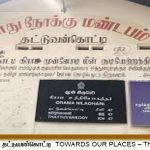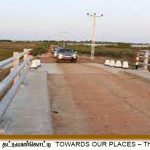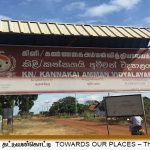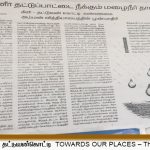

TOWARDS OUR PLACES – Thadduvankoddi

The village, Thadduvankoddi, was often talked about in the media during the wartime. Thadduvankoddi was found between the areas of Elephant Pass and Chundikulam Road that were of military importance during the wartime. The railway line also passed through the village of Thadduvankoddi, and after the opening of the A9 road, the railway line disappeared.
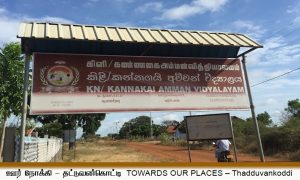
Thadduvankoddi village is an ancient Tamil village in the Kilinochchi district. It is placed in the west of Kunchupparanthan and in the east of Puliyampokkanai under the Karachi Divisional Secretariat.
The northern side of the Thadduvankoddi surrounded by sea and other parts with green and fresh fields. The main occupation of the people here is agriculture and fishing. Ooriyan and Navathkoddi are the neighbor villages of Thadduvankoddi.
In Thadduvankoddi, Kandy Jaffna Road, and in the present Elephant Pass Railway Station once there was a Karachi Association, a public market and a railway station.
Now, everything is destroyed and the village has become less populated.
The Karachi public market in Thadduvankoddi was a massive rectangular building with eight massive pillars made of drumsticks. There was no such massive building in the Kilinochchi district at that time. Thadduvankoddi was centered in Karachi. From the Elephant Pass to the Elephant Beach, there were stone bunkers built during World War until recently. Today the capital of Karachi is a ruined village with no big settlements, a school, a post office and a village with no basic facilities.
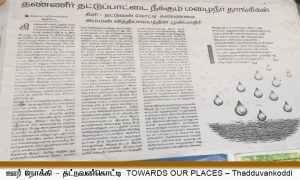
The temple treasure of Puliyampokkanai was always passed from Meesalai to Elephant Pass and through the village, Thadduvankoddi. This was a tradition in the village every year.
Due to the development of roads and railways, the livelihoods of the people in the village, Thadduvankoddi, had been suffered a lot. Because of this and because of the war, people started migrating from here. Currently only a few families are living in Thadduvankoddi.
It is sad, that the village that was once the capital now is going into ruin little by little.
Thanks
- Vaddakachchi
- Vinoth
Sources
- Karai Elil 2014
- Internet
- Jaffna Libra

